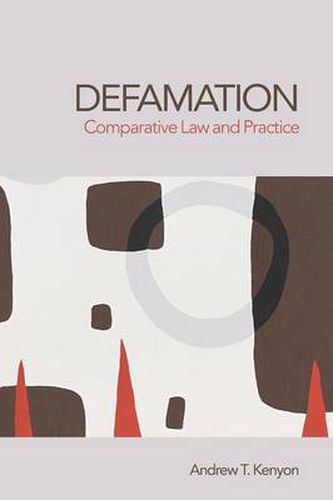Readings Newsletter
Become a Readings Member to make your shopping experience even easier.
Sign in or sign up for free!
You’re not far away from qualifying for FREE standard shipping within Australia
You’ve qualified for FREE standard shipping within Australia
The cart is loading…






This book combines a close analysis of defamation law with extensive empirical research into defamation litigation practice in England, Australia and the US. It provides a detailed explanation of the central issues that are most often at stake in defamation disputes in each country. The book focuses on two themes. The first examines the central role that a publication’s meaning plays in defamation law and practice, especially in England and Australia. The second considers the ways in which media speech is protected by qualified privilege in England and Australia, and by the constitutional rules developed since New York Times v Sullivan in the US. The book provides legal analysis and empirical context that is relevant to understanding important recent changes to defamation law, which have occurred in a number of Commonwealth countries, and compares them with the central constitutional developments to US defamation law since the 1960s. The book combines current doctrinal and empirical material on the major elements of each party’s case in England and in the most significant Australian defamation jurisdictions (namely, each side’s pleading practices; defences of truth, comment and privilege; and litigation practices at pre-trial and trial stages). The book also uses doctrinal and empirical material to explain legal and procedural differences under US law. It enables Commonwealth readers to make more informed use of US law and commentary, and brings the intricacies of English and Australian defamation law to US readers in an accessible manner. In relation to each of its themes - defamatory meaning and privileges for media speech - the book suggests that how different jurisdictions regulate defamation litigation is a major influence on the way reputation and free speech are balanced. Comparative doctrinal analyses need to understand litigation practice if they are to appreciate how each jurisdiction’s law seeks to accommodate the public interest. Such practical, comparative knowledge has great value when digital communications are increasing the risks of transnational liability for defamation, as well as transforming much legal practice. The book is the first to provide such detailed, comparative examination of defamation law and litigation practice. The book’s use of empirical research into litigation also offers important general lessons for comparative law and for lawyers who are interested in doctrinal questions about the common law and speech rights internationally.
$9.00 standard shipping within Australia
FREE standard shipping within Australia for orders over $100.00
Express & International shipping calculated at checkout
Stock availability can be subject to change without notice. We recommend calling the shop or contacting our online team to check availability of low stock items. Please see our Shopping Online page for more details.
This book combines a close analysis of defamation law with extensive empirical research into defamation litigation practice in England, Australia and the US. It provides a detailed explanation of the central issues that are most often at stake in defamation disputes in each country. The book focuses on two themes. The first examines the central role that a publication’s meaning plays in defamation law and practice, especially in England and Australia. The second considers the ways in which media speech is protected by qualified privilege in England and Australia, and by the constitutional rules developed since New York Times v Sullivan in the US. The book provides legal analysis and empirical context that is relevant to understanding important recent changes to defamation law, which have occurred in a number of Commonwealth countries, and compares them with the central constitutional developments to US defamation law since the 1960s. The book combines current doctrinal and empirical material on the major elements of each party’s case in England and in the most significant Australian defamation jurisdictions (namely, each side’s pleading practices; defences of truth, comment and privilege; and litigation practices at pre-trial and trial stages). The book also uses doctrinal and empirical material to explain legal and procedural differences under US law. It enables Commonwealth readers to make more informed use of US law and commentary, and brings the intricacies of English and Australian defamation law to US readers in an accessible manner. In relation to each of its themes - defamatory meaning and privileges for media speech - the book suggests that how different jurisdictions regulate defamation litigation is a major influence on the way reputation and free speech are balanced. Comparative doctrinal analyses need to understand litigation practice if they are to appreciate how each jurisdiction’s law seeks to accommodate the public interest. Such practical, comparative knowledge has great value when digital communications are increasing the risks of transnational liability for defamation, as well as transforming much legal practice. The book is the first to provide such detailed, comparative examination of defamation law and litigation practice. The book’s use of empirical research into litigation also offers important general lessons for comparative law and for lawyers who are interested in doctrinal questions about the common law and speech rights internationally.